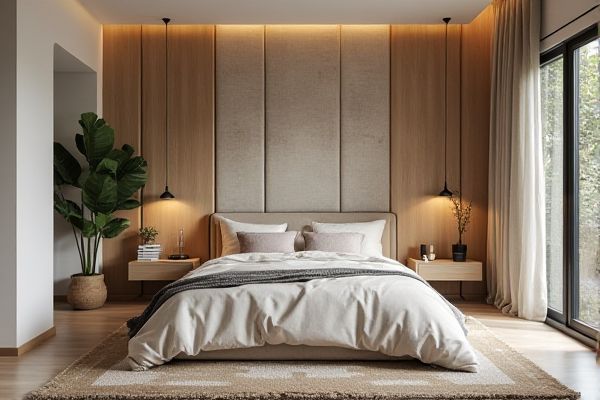
Choosing between a reversible top and a fixed top depends on your need for versatility versus stability; reversible tops offer dual style options in one garment, while fixed tops provide a consistent look with potentially better fit and structure. Discover the pros and cons of each to decide which option best suits your wardrobe needs.
Table of Comparison
| Feature | Reversible Top | Fixed Top |
|---|---|---|
| Design | Two-sided, can be worn inside out | Single-sided, permanent surface |
| Versatility | High, offers multiple style options | Low, limited to one look |
| Durability | May wear unevenly depending on side use | More durable as it uses a single fabric side |
| Cost | Generally higher due to dual functionality | Usually lower, simpler manufacturing |
| Maintenance | Requires care to preserve both sides | Standard maintenance |
Introduction to Reversible Top vs Fixed Top
Reversible tops offer versatile styling options by allowing you to switch between two designs or colors, maximizing your wardrobe choices and value. Fixed tops provide a consistent look and often feature stable construction for reliable wear and durability. Your decision between reversible and fixed tops depends on whether you prioritize adaptability or a specific, unchanging style.
Definition and Key Features
Reversible top refers to a garment or accessory designed to be worn with either side facing outward, offering versatility and dual styling options. Fixed top denotes a clothing item with a single, non-reversible design focused on a specific aesthetic or function. Key features of reversible tops include double-sided fabric and durable construction for wear on both sides, while fixed tops emphasize consistent appearance and often more tailored detailing.
Materials and Construction Differences
Reversible tops often utilize lightweight, breathable fabrics such as cotton blends or polyester mesh for enhanced comfort and versatility, featuring dual designs sewn on opposite sides with reinforced stitching to maintain durability. Fixed tops are typically constructed from heavier, single-sided materials like denim or canvas, providing structure and longevity without the need for reversible functionality. The construction of reversible tops demands meticulous seam finishing and hemming on both sides to ensure wearability from either side, while fixed tops prioritize robustness in one consistent design orientation.
Design and Aesthetic Appeal
Reversible top designs offer versatile aesthetics by allowing users to switch between two distinct looks, enhancing customization and adaptability for various occasions or moods. Fixed top designs emphasize a consistent and cohesive appearance, often showcasing intricate details or premium materials optimized for a singular, polished style. Both approaches cater to different fashion preferences, with reversible tops prioritizing flexibility and fixed tops highlighting a refined, dedicated design statement.
Versatility and Functionality
Reversible tops offer exceptional versatility by providing two distinct styles in one garment, allowing wearers to easily switch looks based on occasion or preference without additional clothing. Fixed tops deliver consistent functionality with a singular design optimized for specific use or fashion, often featuring construction and details tailored to one style for enhanced durability and fit. Choosing between reversible and fixed tops depends on the need for adaptability versus specialized performance and aesthetic focus.
Comfort and Wearability
Reversible tops offer enhanced comfort and wearability by providing two different textures or fabrics, allowing users to choose the side that feels softer or more breathable against the skin. Fixed tops typically feature a single fabric type, which can limit versatility but often ensures consistent fit and structure. The ability to switch sides in reversible tops can reduce irritation and increase adaptability for various climates or activities.
Durability and Maintenance
Reversible tops offer extended durability by allowing users to flip the surface, distributing wear evenly and minimizing damage over time. Fixed tops, while often more stable, are prone to localized wear and may require more frequent maintenance or refinishing. The choice between reversible and fixed tops significantly impacts long-term upkeep costs and product lifespan in furniture applications.
Cost Comparison
Reversible tops typically cost more upfront than fixed tops due to their complex mechanisms and materials designed for dual functionality. Fixed tops offer a more budget-friendly option with lower installation and maintenance expenses, making them suitable for those prioritizing cost efficiency. Your choice depends on balancing initial investment with long-term utility and flexibility.
Ideal Use Cases
Reversible tops are ideal for versatile wardrobes, offering two distinct styles in one garment, perfect for travel or minimalistic fashion enthusiasts. Fixed tops excel in providing consistent fit and design, making them suitable for formal settings and uniform attire where uniformity and reliability are crucial. Choosing between reversible and fixed tops depends on the need for adaptability versus specialized appearance in everyday wear or professional environments.
How to Choose: Reversible Top or Fixed Top
Choosing between a reversible top and a fixed top depends on functionality and style preferences; reversible tops offer versatility with two design options in one garment, ideal for maximizing wardrobe variety and travel convenience. Fixed tops provide a consistent look with often more tailored fits and stable structures, making them preferable for formal occasions or minimalist wardrobes focused on a single aesthetic. Prioritize reversible tops for adaptability and cost-efficiency, while fixed tops suit those valuing defined shapes and reliable wear patterns.
 homyna.com
homyna.com